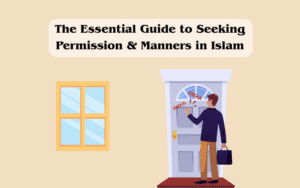Zina in Islam: Its Causes, Consequences, and Solutions

To preserve the human lineage until the Day of Judgment and facilitate its growth, Allah the Almighty instituted the family system. Moreover, this sacred institution allows for the complete practice of Islam by providing a legitimate path to fulfill biological needs and guard one’s chastity. In fact, Allah Himself formed the first human family through Adam (peace be upon him) and Hawa (Eve), a foundational act that underscores the depravity of sins like Zina in Islam.
Family is the cornerstone of human society. It thrives on the mutual fulfillment of rights and unwavering trust between spouses. Conversely, when people violate these rights and trust erodes, the family unit crumbles. This decay, in turn, gives rise to anti-family ideologies and leads individuals down a misguided path into immoral relationships, most notably adultery. In recent times, few social ills have become as alarmingly widespread as infidelity. Like dowry, child marriage, or public harassment, it is indeed a grave symptom of personal and moral decay. Daily news reports are filled with stories of extramarital affairs where, tragically, the victims are often spouses, children, parents, and other family members. Therefore, this article will provide a comprehensive Islamic perspective on the causes of this sin, its severe consequences, and the path to prevention and remedy.
What is Zina in Islam? A Clear Definition
Adultery, known as Zina in Arabic, refers to any instance where a married man or woman engages in a romantic or sexual relationship with someone other than their lawful spouse. Islam considers it a deeply negative and reprehensible act in society. Essentially, it is the act of betraying the sacred marital bond to engage in fornication or an extramarital affair.
Exploring the Root Causes of Infidelity in Marriage
The rate of infidelity in modern society has surged. For instance, the renowned Belgian psychotherapist Esther Perel, in her book The State of Affairs, compares adultery to cancer for its destructive nature. There are numerous reasons why married individuals become entangled in such affairs. Some of the key causes are detailed below.
Lack of Islamic Knowledge:
First and foremost, Islam commands marriage to protect one’s character. It has also declared all extramarital relationships strictly forbidden (haram). Consequently, a lack of understanding about this prohibition and its severe punishment causes people to fall into this heinous sin.
Societal and Cultural Pressures:
Although Islam permits a man to have more than one wife under specific conditions, many men are deterred by social stigma. This can lead to unfulfilled needs within the marriage, thereby pushing some toward illicit relationships.
Unrestricted Free Mixing:
When non-mahram (marriageable) individuals mix freely without observing Islamic guidelines, mutual attraction can develop. In many cases, this escalates into an affair. For this reason, Islam strictly prohibits such unrestricted interaction.
Lack of Modesty (Haya) and Hijab:
A primary driver of adultery is the abandonment of modesty and proper Islamic dress (Hijab). Specifically, it creates opportunities for glances, conversations, and interactions that breed attraction.
Forced Marriages:
When a marriage is conducted without the willing consent of the man or woman, it often leads to an unhappy life together. This situation makes them vulnerable to seeking comfort and affection elsewhere.
Physical and Emotional Dissatisfaction:
Furthermore, unfulfilled physical intimacy or emotional connection within a marriage is a significant factor. It can lead a spouse to seek fulfillment outside the marital bond, a path that can lead to Zina in Islam.
Inappropriate Attire:
Tight, revealing, or flashy clothing worn by women can attract unwanted attention from men. That is precisely why Islam prescribes modest attire.
Influence of Western Culture:
The adoption of Western cultural norms that promote casual relationships, immodest dress, and free mixing has also contributed significantly to the rise of infidelity in Muslim communities.
Incompatibility and Imbalance:
In addition, significant disparities in age, financial status, education, or social background can create a mental gap between spouses, making them susceptible to affairs.
The Double-Edged Sword of Technology:
While technology has made life easier, smartphones and social media have also made it dangerously easy to form illicit relationships. This has led to countless cases of online and real-world infidelity.
Work-Related Separation:
Spouses who live apart due to job commitments are at a higher risk. Likewise, developing close, inappropriate bonds with colleagues can lead to extramarital affairs.
The Influence of Foreign Media:
Many foreign TV shows and movies normalize or even glorify infidelity. As a result, they desensitize viewers to its sinfulness and present it as a viable solution to marital problems.
Weak Legal Deterrents:
Finally, in many modern legal systems, adultery is not considered a serious crime. This lack of consequence reduces the societal deterrent against it.
The Islamic Ruling and Punishment for Zina in Islam
Islam prescribes severe punishments for adultery. These rulings reflect the gravity of the sin in both this world and the Hereafter.
Worldly Consequences and Legal Punishments
When adultery is proven through credible witnesses or a confession, Islamic law dictates two different punishments.
- For Unmarried Individuals: The punishment is 100 lashes and exile for one year. Guidance on adultery in the Quran is clear in Surah An-Nur:الزَّانِيَةُ وَالزَّانِي فَاجْلِدُوا كُلَّ وَاحِدٍ مِنْهُمَا مِائَةَ جَلْدَةٍ “The [unmarried] woman or [unmarried] man found guilty of sexual intercourse – lash each one of them with a hundred lashes…” (Quran, Surah An-Nur 24:2)
- For Married Individuals: The prescribed punishment is stoning to death (rajm). The practice of the Prophet (peace be upon him), as recorded in the Hadith, confirms this punishment for married individuals who commit this grave sin. However, it is crucial to note that implementing such punishments is the sole responsibility of a legitimate Islamic governing authority, not individuals or vigilante groups.
Punishment in the Hereafter
The spiritual consequences of Zina in Islam are even more severe, with punishments beginning in the grave.
- Punishment in the Grave: In a long hadith, the Prophet (peace be upon him) described seeing adulterous individuals being punished in an oven-like pit, engulfed by fire from below.(Sahih al-Bukhari, 7047).
- Punishment on Judgment Day: Similarly, the Prophet (peace be upon him) stated that there are three people Allah will not speak to, purify, or even look at on the Day of Judgment. Among them is “an old man who commits adultery,” who will face a painful punishment (Sahih Muslim, 107).
The Devastating Consequences of Adultery
Infidelity is a forbidden relationship that brings ruin to individuals, families, and society. Allah explicitly warns against even approaching this sin:
وَلَا تَقْرَبُوا الزِّنَا ۖ إِنَّهُ كَانَ فَاحِشَةً وَسَاءَ سَبِيلًا
“And do not approach unlawful sexual intercourse. Indeed, it is ever an immorality and is evil as a way.”
(Surah Bani-israil 17:32)
The devastating impacts of Zina in Islam include:
- Extreme Mental Anguish: The betrayed spouse experiences intense anger, distrust, grief, and psychological trauma.
- Violence and Murder: Shockingly, affairs are a leading motive for domestic violence and, in tragic cases, murder.
- Family Breakdown and Divorce: Infidelity shatters the foundation of trust in a marriage and is one of the primary causes of divorce.
- Social Instability: Furthermore, it destroys happy homes, creates chaos, and undermines the moral fabric of the community.
- Negative Impact on Children: A parent’s affair has a catastrophic effect on a child’s mental health, often leading to depression and aggression.
- Birth of Illegitimate Children: Affairs can result in children born outside of wedlock, thereby disrupting the sanctity of lineage protected by Islam.
- Depression and Suicide: The shame, guilt, and public humiliation can drive the involved parties or the betrayed spouse to suicide.
- The Ultimate Punishment of Hellfire: Ultimately, the final and most terrifying consequence of unrepented adultery is eternal punishment in Hellfire.
How to avoid adultery: Islamic Guidance
Preventing infidelity requires a proactive and conscious effort from both spouses, grounded in Islamic principles.
A Husband’s Role in Preventing Infidelity
- Implement Islamic Values at Home: Create a household environment based on Islamic teachings, including observing Hijab and guarding interactions.
- Use Kind Words and Show Appreciation: A husband’s kindness is charity. Therefore, he should verbally express his love and appreciation for his wife.
- Give Her Quality Time: In today’s busy world, husbands must make a dedicated effort to spend quality time with their wives.
- Value Her Opinion: A husband should respect his wife’s intelligence by consulting her on family matters, just as the Prophet (peace be upon him) did.
- Practice the Sunnah of Salam: Greet your wife with “Assalamu Alaikum” when entering the home. This simple act increases love and blessings.
- Avoid Baseless Suspicions: Trust your wife. If doubts arise, address them through open communication, not through accusations.
- Maintain Her Hijab and Privacy: A husband is responsible for his wife’s modesty. Thus, he should not encourage her to mix freely with his friends or non-mahram relatives.
- Beautify Yourself for Her: Additionally, a husband should also take care of his appearance and hygiene for his wife.
- Overlook Her Flaws: No one is perfect. For this reason, a husband should be patient with his wife’s minor shortcomings.
- Fulfill Her Physical Needs: Intimacy is a right of the wife. A husband must be attentive to her physical needs, as neglecting this can create a major vulnerability.
- Be Just with Multiple Wives: If a man has more than one wife, he must be scrupulously fair and just between them as commanded in the Quran.
A Wife’s Role in Safeguarding the Marriage
- Be Patient During Disagreements: When a husband is angry, a wife’s patience and gentle response can de-escalate the situation.
- Beautify Yourself for Your Husband: A wife should strive to be attractive and appealing to her husband within the privacy of their home.
- Stay with Your Husband: A wife’s primary place is with her husband. Unnecessary or prolonged separation can weaken the marital bond.
- Respond to Your Husband’s Call: A wife should not refuse her husband’s call to intimacy without a valid Islamic reason. In fact, the Prophet (peace be upon him) warned that angels curse a wife who refuses her husband without cause.
- Be Content and Grateful: A wife who is content with what her husband provides earns his deep respect and affection.
- Manage the Home Wisely: By managing her household duties efficiently, a wife can dedicate more time and energy to her husband. As a result, she can strengthen their connection and protect him from outside temptations.
Conclusion: Fostering a God-Conscious and Faithful Marriage
In conclusion, adultery is a destructive social disease and a major sin. The most powerful defense against this ruinous act is to build a family life centered on Islamic principles and a sincere fear of Allah (Taqwa). When both spouses are conscious of their duties, fulfill each other’s rights, and live a life of mutual respect, they can build a happy and sacred home that is protected from the whispers of Satan.
May Allah the Almighty grant us all the ability to stay away from the heinous sin of Zina in Islam and protect our families. Ameen.
Frequently Asked Questions
What is the punishment for Zina in Islam?
According to Islamic law, the punishment for Zina is severe and depends on the marital status of the individual. For unmarried individuals, the punishment is 100 lashes. For married individuals, the punishment is stoning to death (rajm). However, these punishments can only be implemented by a legitimate Islamic governing authority
What are some of the main causes of Zina in modern society?
The article identifies several root causes, including a lack of Islamic knowledge and the abandonment of modesty (hijab), which encourages free mixing between unmarried men and women. Other factors include unfulfilled physical and emotional needs within a marriage, the influence of Western culture and media, and the misuse of technology like social media.
What are the major consequences of Zina?
Zina has devastating consequences for individuals and society. It can lead to extreme mental anguish, divorce, and the destruction of the family unit. It also has a catastrophic impact on children, can lead to violence, and results in the birth of illegitimate children. The ultimate consequence is a severe punishment in the Hereafter.
How can couples prevent Zina according to Islamic teachings?
Preventing Zina requires both spouses to follow Islamic principles. Husbands should be kind, appreciative, and attentive to their wives' physical and emotional needs. Wives should be patient, responsive, and take care of their appearance for their husbands. Both spouses should build their family life on Islamic values, mutual respect, and a sincere fear of Allah (Taqwa).









